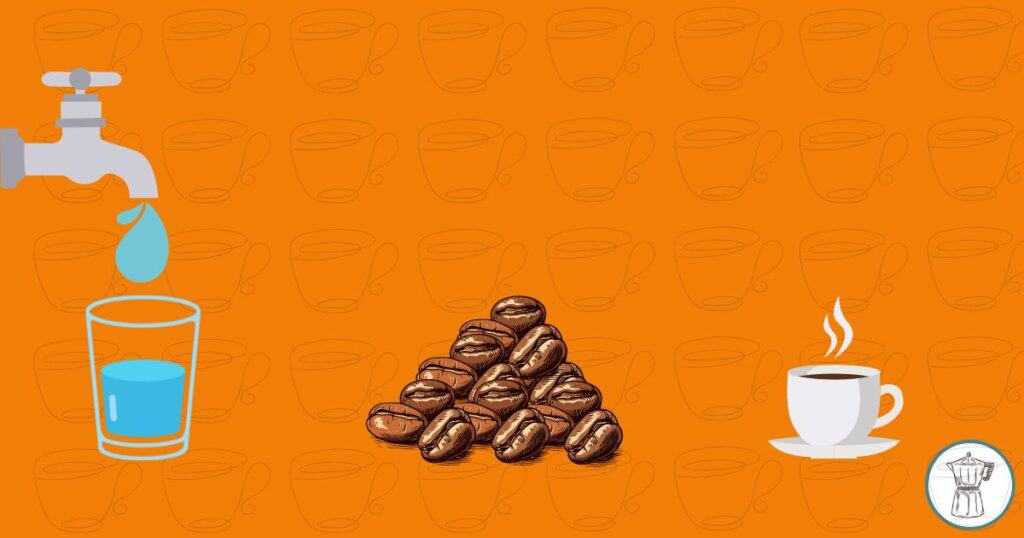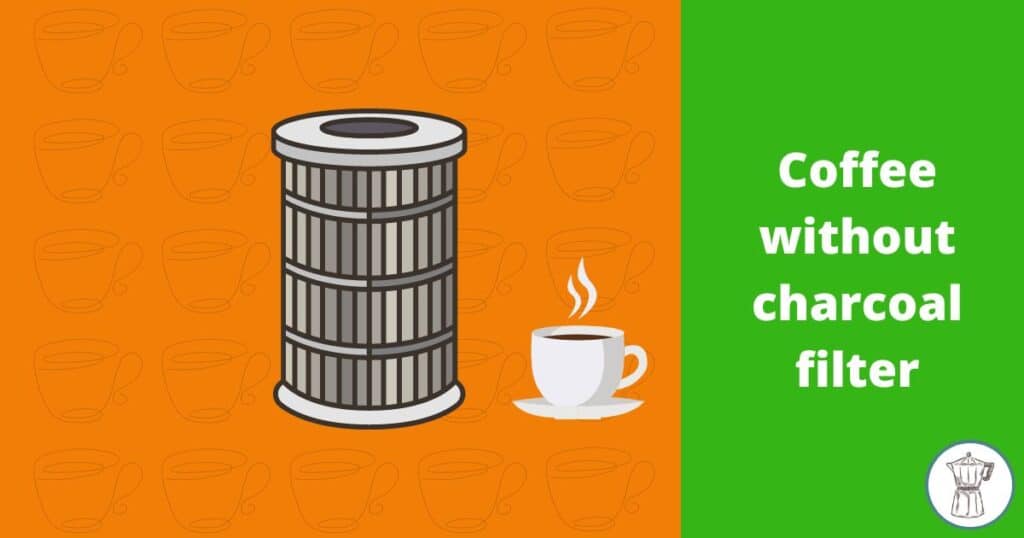You know that thing where you put the charcoal filter in your coffeemaker and it makes the coffee taste better? Well, you don’t need to do that anymore, just make coffee like normal and it will taste great. No more buying those expensive filters, just use what you’ve got. Let’s get started.
Key takeaways:
- The one single reason you need a charcoal filter to brew coffee
- How often you need to replace your charcoal filter to ensure your coffee is great
- The dead easy step-by-step process for replacing your charcoal filter in less than 5 minutes
Can you brew coffee using your Cuisinart Coffee Maker without the charcoal filter?
What happens if you’re out of filters? Can you still brew coffee using your Cuisinart coffee maker without the charcoal filter?
The answer is YES.
Here’s a nifty tip:
- Make sure you use bottled water or filtered water. The taste of your coffee is going to be up to the usual level.
But if you use tap water to make coffee without a charcoal filter, keep in mind that your brew might have a strong taste and smell. Plus, it’s probably not good for your health; the charcoal filter can stop toxins.
What’s the use of a charcoal water filter?
Activated charcoal is able to remove impurities from water, making it cleaner can also remove certain toxins including lead and mercury. That’s because charcoal is highly absorbent; it can trap impurities and contaminants. Using a charcoal filter is an easy and effective way to improve the quality of your water.
And what’s more, a charcoal filter doesn’t block water minerals conducive to your health including calcium. K&J 12-Pack is an excellent filter option for your coffee maker to replace it when needed. And if you don’t have a coffee filter is good to look for coffee filter alternatives.
Wonder how to replace it? Watch this useful and short video that shows you how to change your charcoal filter.
Problems when making coffee using tap water
If you’ve ever made coffee at home and ended up with a cup that’s more muddy than brewed, you’re not alone. In fact, one of the most common complaints about home-brewed coffee is that the water isn’t up to snuff.
That’s because coffee is about 98% water, so the quality of your H2O has a huge impact on the final product.
Unfortunately, most tap water is loaded with minerals like calcium and magnesium, which can give coffee a bitter taste. Additionally, chlorine is often added to tap water as a disinfectant, and this can also impart an off-flavour to coffee.
The good news is that there are some easy solutions to this problem.
For starters, you may want to invest in a simple filter for your kitchen sink. Or, if you’re really serious about your brew you can purchase a special coffee maker that comes with its own built-in filtration system. Either way, once you start brewing with clean water, your brew it’s going to taste one million times better.

How does your coffee maker get affected by water hardness?
If you live in an area with hard water, you might have noticed that your coffee maker doesn’t seem to be working as well as it used to and over time, minerals in the water can build up on the inner workings of the coffee maker, causing it to become less efficient.
If you want to keep your device in good condition, it’s important to know how to use your coffee maker and descale it on a regular basis. (Do you know how to descale a Smeg espresso machine?) This will remove the mineral deposits and help extend the life of your coffee maker. Another way to spend less on coffee is to know how many watts a coffee maker uses.
Of course, if you live in an area with soft water, you probably don’t have to worry about this problem.
Are charcoal filters necessary for coffee makers?
For coffee lovers, there is nothing worse than a pot of bitter-tasting brew. Unfortunately, this can happen if your coffee maker isn’t properly cleaned, and it’s a common belief that one of the best ways to clean a coffee maker is to use a charcoal filter. Charcoal filters can improve the taste of your coffee by removing chlorine from tap water.
Plus, a charcoal filter prolongs the lifespan of your coffee maker; residue doesn’t build up easily; you won’t need to fork out on a new coffee maker any time soon.
It might cost you to buy a new filter now again, it’s a necessary evil if your aim is to always have nothing but top quality coffee.
Here’s what a true coffee lover has to say about making coffee without a charcoal filter:
I’ve had a couple of coffee makers that come with an optional thingy that holds a paper covered charcoal filter to be placed down at the bottom of the water reservoir.
The first time I saw such a thing, I thought “Nope…not getting me to routinely buy some extra additional replacement filters” and didn’t even put the thing in the coffee maker, just tossed it into a drawer. I usually use filtered water from a water cooler & saw no need for the charcoal pod.
Was recently brewing coffee and realized I was out of filtered water, and had to reluctantly use tap water from the faucet. I remembered the extra charcoal filter in the drawer and put it in the coffee maker just wondering if it would accomplish anything. I can’t say that I noticed any perceived difference in regard to having used tap water or from there being a charcoal filter. I’ve gone through the process several more times because I was lazy and just kept using faucet water.
After brewing a pot of coffee, it doesn’t seem like the greatest idea to have a wet damp extra thing down at the bottom of your coffee maker, even if it is just charcoal & paper. In fact, after brewing, I pulled the holder out to let it dry, and took out the charcoal filter and sat it out to dry, just thinking this seemed more sanitary. I always leave the top of the coffee maker propped open after brewing anyway to let the interior dry out.
– r/Coffee
Do you need to replace your filter frequently?
Α good rule of thumb is to change your filter every two months or after about sixty brew uses.
Over time, coffee makers can become clogged with mineral deposits from hard water. This can impact the taste of the coffee and even damage the machine.
However, if you notice that your coffee isn’t tasting as good as it should be, it’s a good idea to check the filter and see if it needs to be replaced sooner.
Another way to go about it is to change the filter every time you descale your coffee maker – this way every part of your machine is going to work as if it’s brand new.
Where is the Cuisinart coffee maker’s water filter placed?
You can find the water filter in the water tank, so the water goes through and it’s filtered. Watch this short video about replacing the water filter in a Cuisinart coffee maker to get a better understanding.
How to replace a Cuisinart coffee maker’s charcoal filter
Let’s go over the simple steps to replace the filter of your Cuisinart coffee maker.
What you’ll need:
- Washing-up liquid
- A sponge
- A bowl
Here are the steps:
- Soak the new filter in a bowl with water for about 10-15 minutes to remove any possible loose particles.
- Remove the water tank from the coffee maker and take the old filter out of the filter holder.
- Give the filter holder a good wash using washing-up liquid and after rinsing it, place the new filter in the holder.
- Put the water tank back in the coffee maker and you’re good to go.
| Replacing your charcoal filter: | Description: |
| Step1 | Place the new filter in water for about 15 minutes |
| Step2 | Take off the water tank of your coffee machine |
| Step3 | Wash the area of your coffee brewer where the tank seats on |
| Step4 | Replace the old filter with the new one |
Is it safe to use charcoal coffee filters?
Charcoal coffee filters are absolutely safe to use, and in fact, they block toxins from ending up in your sacred cup of coffee.
Interestingly, research shows that when the charcoal filter isn’t replaced regularly, bacteria build up in it, changing the taste of your brew.
Top tip: Next time you need to purchase a charcoal filter, go for those that are certified by NSF (National Sanitasion Foundation) that do thorough product testing before certifying any kind of products.
What are the best alternatives to charcoal filters?
Non-charcoal filters come in all shapes, sizes, and effectiveness, but my personal favourite is the Brita water filter.
I know, I know, you’re probably thinking that’s more of a water pitcher than an actual filter.
But hear me out.
The Brita filter not only gets rid of all the yucky stuff in your water like chlorine and lead, but it also makes your water taste way better. It’s seriously like drinking bottled water, but without all the waste or the expense.
Plus, it’s really easy to use – you just fill up the pitcher and let it do its thing.
And when the indicator light tells you it’s time to change the filter, you just twist on a new one and you’re good to go.
Does A Keurig require the use of a Charcoal filter?
If you’re considering buying a Keurig coffee maker, it’s wise to know whether the model you’re planning to go for requires the use of a charcoal filter.
While some models of Keurig machines come with a charcoal filter installed, other models do not. So if you’re planning on purchasing a Keurig, be sure to check whether or not it includes a charcoal filter.
The good news is most Keurig filters are universal apart from Keurig mini plus and Rivo systems. Plus, the fact that you can use ground coffee in a Keurig is another reason to own one.
Wrapping it up
So there you have it! You can make coffee without a charcoal filter. It’s not as complicated as it sounds, and once you get the hang of it, you can impress all your friends with your barista skills. It’s always great to have alternatives for making coffee, and brewing without charcoal is a great one. Learn how to descale your Wolf brewer or Braun coffee brewer.
- How to Remove Coffee Stains From Countertop The Easy Way - December 21, 2023
- Can You Reuse Coffee Grounds in French Press? Truth Inside - December 12, 2023
- Can Expired Coffee Creamer Make You Sick? 3 Ways to Find Out - December 9, 2023
